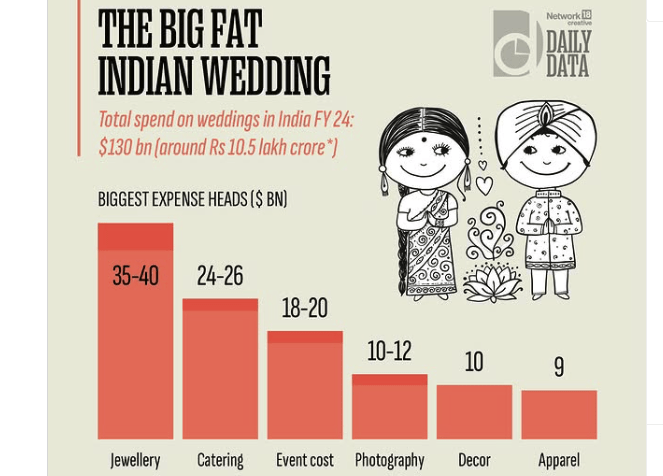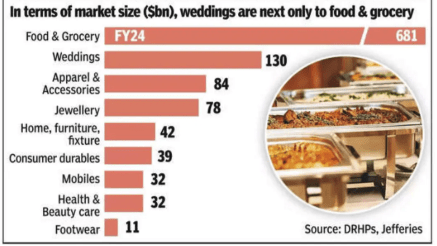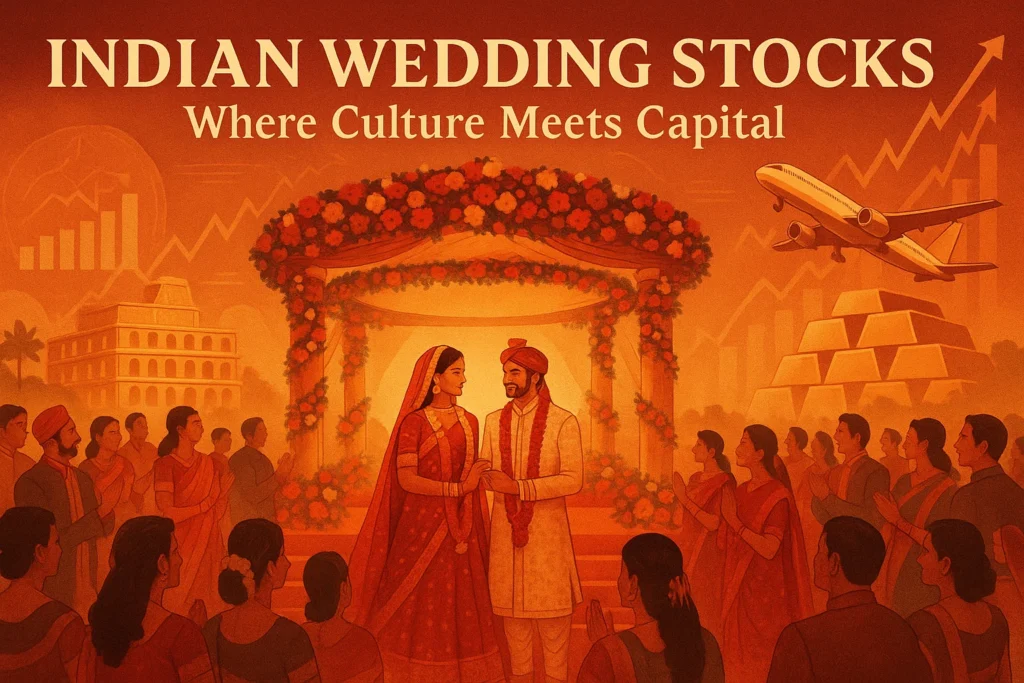Indian weddings are grand, glittery, and deeply emotional. But beneath the layers of lehengas and laddu boxes lies an economic powerhouse — one that quietly fuels India’s retail, hospitality, jewellery, finance, and consumer sectors.
For investors, this isn’t just a cultural celebration — it’s a thematic play with multibagger potential.
Let’s dive into the sectors and stocks poised to shine in India’s ever-growing wedding ecosystem — and why Indian Wedding Stocks may be the smartest guest at the party.
A ₹10.5 Lakh Crore Market: Why Weddings Are a Big Deal
In 2023, India’s wedding industry crossed ₹10.5 lakh crore ($130 billion), making it the second-largest wedding market globally after China. With over 10 million weddings annually, and each costing anywhere from ₹15 lakh to ₹5 crore, this sector rivals the likes of FMCG and real estate in spend impact.

This isn’t a seasonal fad — it’s an evergreen sentiment-driven consumption engine, and one that survives recessions better than most.
Weddings in India: A Trillion-Rupee Opportunity
First, a reality check. The average Indian wedding now costs ₹32–35 lakhs, with premium ones easily crossing ₹1 crore. From catering and couture to jewellery and jet tickets, no expense is spared.
This indulgence isn’t a one-off. With over 10 million weddings every year, the industry is now the second-largest retail sector in India, after food and groceries.

Weddings = Spending. And spending = Stock market impact.
Indian Wedding Stocks: Where the Real Money Is Made
Every haldi, mehendi, and sangeet puts money into the pockets of businesses — many of them listed companies. As an investor, this is where you look beyond the bride’s lehenga and start tracking earnings per share.
Let’s explore which sectors — and stocks — benefit most from this emotional economy.
Jewellery: The Golden Heart of Indian Weddings
Walk into any Indian wedding, and you’ll likely see more gold than the RBI’s reserves. From heirloom necklaces passed down generations to sleek diamond sets picked from a Tanishq showroom — jewellery isn’t just a fashion statement at weddings, it’s an emotional investment.
And it’s big business.
The Numbers That Shine
As of FY24, the Indian jewellery market stood at a massive $87.82 billion. But here’s the real sparkle — it’s projected to reach $195.35 billion by FY32, growing at a CAGR of 10.5%.

Now guess how much of that comes from weddings?
Over 50% of the jewellery industry’s revenues are driven by bridal purchases. Not surprising when you consider that gold isn’t just for show — it’s security, status, and sentiment wrapped in one.
What Are Families Spending?
Middle-class Indian families spend anywhere from ₹5 to ₹25 lakhs on wedding jewellery. High-net-worth families go even further — sometimes crossing ₹5 crore in gold, diamonds, and polki sets. Whether it’s for the bride, groom, or the proud mother-of-the-bride, everyone gets a slice of the sparkle.
And the best part? It’s recession-resistant. When inflation rises, gold prices go up — and so do jewellers’ margins.
The Investment Angle
Weddings in India don’t get cancelled; they get downsized. Even in a slower economy, people don’t cut back on gold — they just go for lighter sets, but they buy. That means jewellery companies see predictable seasonal surges every year — especially in Q3 and Q4.
That predictability? A blessing for investors.
Indian Wedding Stocks in Jewellery
| Company | Why It’s on the Radar |
|---|---|
| Titan Company (Tanishq) | India’s most trusted jewellery brand. Focused on premiumisation and millennial-friendly design. |
| Kalyan Jewellers | Dominant in Tier 2/3 cities. Leverages trust and regional loyalty. |
| Senco Gold | Strong eastern India presence, targeting both gold and fashion jewellery. |
| Thangamayil Jewellery | Tamil Nadu-based player with smart mix of jewellery sales and gold loans. |
Hospitality: Where Mandaps Meet Margins
Weddings don’t just fill hearts — they fill hotel rooms.
During peak shaadi season, luxury hotels across India are booked out months in advance. Taj Lake Palace becomes a royal backdrop, while a Lemon Tree in Jaipur transforms into a bustling sangeet venue.
The Big Picture
The Indian wedding services market touched $103.9 billion in 2024, and is expected to grow at 14.3% CAGR. Hospitality — especially venues and catering — makes up over 30% of that spend.
Some hotels report a 35–45% revenue jump during wedding months. One weekend, one wedding, and the bill can hit ₹1 crore.
Indian Wedding Stocks in Hospitality
| Company | Why It Matters |
|---|---|
| Indian Hotels (Taj) | Preferred brand for ultra-luxury weddings |
| EIH Ltd. (Oberoi) | Palatial venues, high-end destination favourites |
| Lemon Tree Hotels | Affordable scale for mid-income wedding crowds |
| Chalet Hotels | Upscale city hotels benefiting from banquet demand |
💡 Investor takeaway: Weddings = full rooms + full banquet halls = full earnings reports.
Banking & Finance: Where EMIs Say “I Do”
In India, weddings are an emotional affair — and increasingly, a financed one.
With average wedding costs hovering around ₹30–40 lakhs, not every family pays out of pocket. Instead, they’re turning to banks and NBFCs to fund their dream shaadis.
The Financial Reality
- Wedding loan demand jumped 40% between 2020–21
- A 2023 survey found that 26% of millennials planning to self-fund weddings considered taking a personal loan
- Most borrowed between ₹1–5 lakhs
It’s not just about loans — credit card usage spikes, EMI options on jewellery and appliances increase, and banks push targeted wedding financial products.
Indian Wedding Stocks in Finance
| Company | Why It’s a Bet |
|---|---|
| HDFC Bank, ICICI Bank, SBI | Lead in wedding loans and credit solutions |
| Bajaj Finance | Powers EMI-based wedding shopping, gifting, and gold purchases |
| Muthoot Finance, Manappuram Finance | Popular for gold-backed loans, especially in Tier 2/3 markets |
💡 Investor takeaway: Every shaadi season, finance stocks quietly benefit — without even showing up in the baraat.
Consumer Durables & Gifting: Ghar Bhi Naya, Samaan Bhi Naya
After the wedding comes the home setup — and it’s a shopping marathon.
Newlyweds often start their life together with fresh appliances, furnishings, and yes, a brand-new four-piece luggage set. Add to that the gifts from relatives (both thoughtful and not-so-thoughtful), and what you get is a retail explosion.
A Quick Breakdown
- India’s gifting market stood at $75.16 billion in 2024, expected to cross $92.32 billion by 2030
- Weddings account for 5% of spend on electronics & durables, 4% on gift items
Whether it’s a microwave from a bua or a king-size bed from the in-laws — every item adds to corporate India’s top line.
Indian Wedding Stocks in Durables & Gifting
| Company | Why It’s Worth Watching |
|---|---|
| VIP Industries | Luggage leader, wedding gifting essential |
| Voltas, Whirlpool | Big-ticket appliances for new homes |
| Asian Paints, Trident, Welspun Living | From fresh walls to trousseau towels |
💡 Investor takeaway: Weddings don’t just unite people — they activate shopping lists. And that drives margins for months post-wedding.
Travel & Aviation: Where Weddings Take Flight
Destination weddings. Family reunions. Honeymoons in the Maldives. Weddings have become big business for airlines and travel planners.
It’s not just the bride and groom flying off — it’s also the 100+ relatives, the wedding planners, the mehendi artists, and the DJ. And yes, they all need tickets, hotels, and custom itineraries.
The Sky-High Impact
- Analysts valued India’s destination wedding market at $3.5 billion in 2024 and project it to reach $25.7 billion by 2033, growing at a 22.1% CAGR.
- Indian weddings contributed $1.9 billion in outbound travel spending alone in 2024
From Jaipur to Jim Corbett, Udaipur to Uluwatu — shaadi season turns airports into baraats.
Indian Wedding Stocks in Aviation
| Company | Why It Takes Off |
|---|---|
| InterGlobe Aviation (IndiGo) | India’s largest airline, a go-to for group wedding travel and budget honeymoons |
| Indian Hotels, MakeMyTrip (unlisted) | Indirect plays offering packaged destination wedding deals |
💡 Investor takeaway: If there’s one thing Indians won’t compromise on post-wedding — it’s the honeymoon. And airline stocks benefit, season after season.
Matchmaking Services: Where the Stock Story Begins
Before the jewellery, the hotel, the flight, or the lehenga… there’s a bio-data.
In the age of apps and algorithms, people are arranging love online — and platforms that let them swipe, shortlist, and shaadi are now catching attention on the stock market too.
The Matchmaking Momentum
- India’s online matchmaking market was estimated at ₹800 crore (~$100M) in 2022
- Expected to grow to ₹2,000 crore (~$250M) by 2027
- 12 million+ users are actively using these platforms
- Online platforms now arrange about 6% of all Indian marriages.
It’s not just about matchmaking anymore — it’s end-to-end wedding ecosystem monetisation: ads, subscriptions, wedding planning, and financial services.
Indian Wedding Stocks in Matchmaking
| Company | Why It’s in the Spotlight |
|---|---|
| Matrimony.com | Operator of BharatMatrimony and several regional platforms; first-mover advantage with a loyal user base and strong monetisation |
💡 Investor takeaway: More young Indians are taking a digital-first approach to wedding planning, positioning this sector to scale and deliver surprising growth.
Final Thought: Make Weddings Work for Your Wealth
In India, weddings aren’t just about rituals — they’re about emotion, celebration, and unapologetic spending. From the shine of a gold necklace to the buzz of a destination wedding, every shaadi tells a story. But for smart investors, it also tells a pattern — one of consistent, seasonal, and high-value consumption.
So the next time you attend a wedding, don’t just admire the jewellery or critique the biryani.
Look a little closer — at the businesses powering it all.
Because when the dhols quiet down and the lights go out, the numbers still dance — in revenue reports, quarterly earnings, and yes, in stock returns.
🎯 And if you’re ready to make this celebration part of your portfolio, Angel One helps you invest in the companies that make weddings magical — from Titan to Taj, and everything in between.
Celebrate love. Invest in the business of it.
Start your journey with Angel One — where India’s biggest celebrations meet smarter investments.
Frequently Asked Questions (FAQs)
What are Indian Wedding Stocks?
Indian Wedding Stocks are shares of companies that benefit directly or indirectly from spending related to Indian weddings, such as jewellery, hotels, loans, fashion, and gifting.
Why do weddings impact the stock market in India?
Weddings trigger large-scale seasonal spending, boosting quarterly earnings of sectors like hospitality, jewellery, and consumer durables — all of which are represented in listed stocks.
Is jewellery a good investment sector during wedding season?
Yes. Wedding jewellery contributes over 50% of jewellery industry revenue in India, making it a strong seasonal driver of stock performance.
What is the size of the Indian wedding market?
India’s wedding industry is worth over ₹10.5 lakh crore ($130 billion), making it the second-largest in the world after China.
Do banks benefit from weddings?
Yes. Many Indian families take wedding loans, boosting disbursements for personal loan-focused banks and NBFCs.
Are destination weddings boosting hotel stocks?
Absolutely. Luxury hotels see 30–45% revenue spikes during wedding months, directly benefiting stocks like Indian Hotels and Oberoi.
Can I invest directly in the wedding industry?
Not directly — but you can invest in companies that serve it, like Titan (jewellery), Lemon Tree (hotels), or Matrimony.com (matchmaking).
What makes Indian weddings recession-proof?
Weddings are deeply cultural and rarely cancelled — spending may be adjusted, but the ceremonies continue.
Are there any wedding ETFs or mutual funds?
Currently, no India-specific “wedding theme” funds exist, but you can create your own basket of wedding-linked stocks.
What’s the best time to buy wedding stocks?
Ahead of wedding-heavy quarters (Q3 and Q4), when companies gear up for demand and stock prices start reflecting forward earnings.
Related Articles
India’s Defense Dream: How Bharat is Building Bombs, Business, and Billion-Dollar Bets






